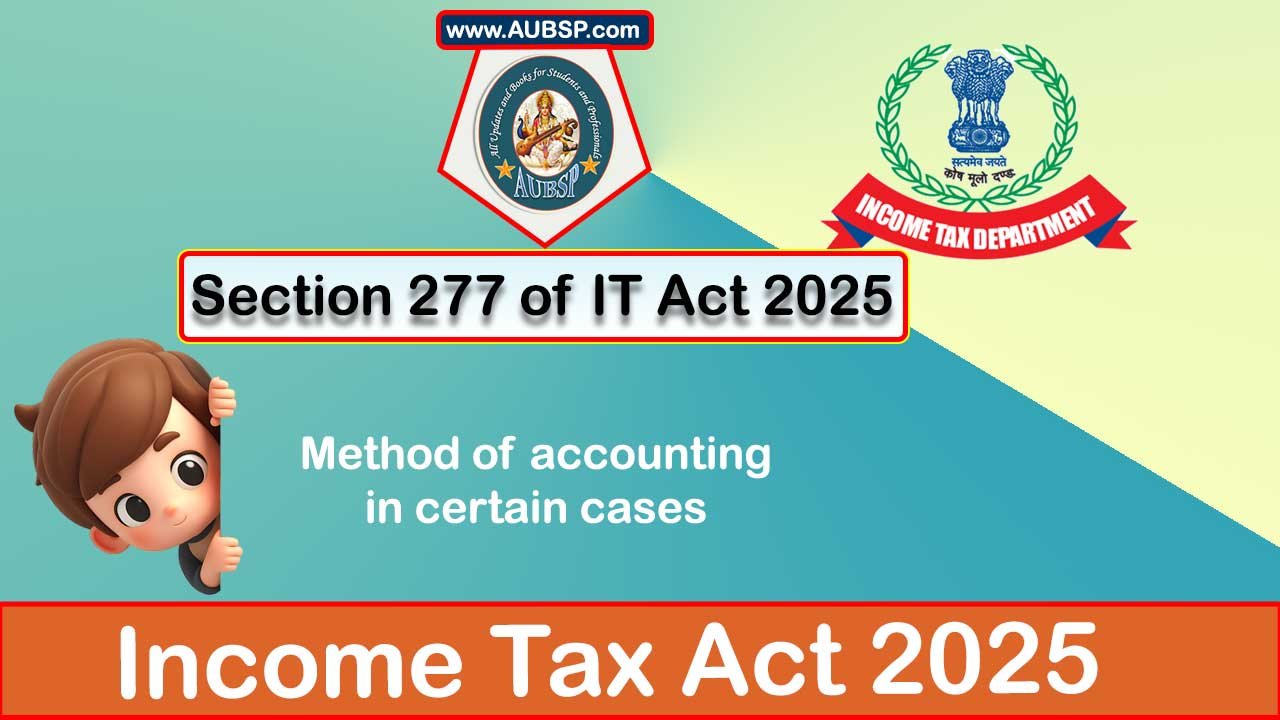Method of accounting in certain cases
[Section-277 as per the Income Tax Act, 2025 (this Act) w.e.f. 1st April, 2026.]
Section 277(1) of Income Tax Act 2025
277(1) For the purposes of determining the income chargeable under the head “Profits and gains of business or profession”,—
- (i) the valuation of inventory shall be made at lower of actual cost or net realisable value computed as per the income computation and disclosure standards notified under section 276(2);
- (ii) the valuation of purchase and sale of goods or services and valuation of inventory shall be adjusted to include any tax, duty, cess or fee (by whatever name called) actually paid or incurred by the assessee to bring the goods or services to the place of its location and condition as on the date of valuation;
- (iii) the inventory being securities not listed on a recognised stock exchange, or listed but not quoted on a recognised stock exchange with regularity from time to time, shall be valued at actual cost initially recognised as per the income computation and disclosure standards notified under section 276(2);
- (iv) the inventory being securities other than those referred to in clause (iii), shall be valued at lower of actual cost or net realisable value as per the income computation and disclosure standards notified under section 276(2).
Section 277(2) of Income Tax Act 2025
277(2) For the purposes of sub-section (1), the inventory being securities held by a scheduled bank or public financial institution shall be valued as per the income computation and disclosure standards notified under section 276(2) after taking into account the extant guidelines issued by the Reserve Bank of India in this regard.
Section 277(3) of Income Tax Act 2025
277(3) For the purposes of sub-sections (1) and (2), the comparison of actual cost and net realisable value of securities shall be made category-wise.
Section 277(4) of Income Tax Act 2025
277(4) For the purposes of this section, any tax, duty, cess or fee (by whatever name called) under any law in force, shall include all such payment irrespective of any right arising as a consequence to such payment.
Section 277(5) of Income Tax Act 2025
277(5) In this section, “public financial institution” shall have the same meaning as assigned to it in section 2(72) of the Companies Act, 2013.
FAQs on Section 277 of Income Tax Act 2025
What is the method of valuing inventory under Section 277(1)(i)?
Inventory must be valued at the lower of actual cost or net realisable value, computed in accordance with the income computation and disclosure standards notified under section 276(2).
Are taxes and duties included in inventory valuation?
Yes, as per Section 277(1)(ii), the valuation of purchase and sale of goods or services and inventory must include any tax, duty, cess, or fee paid or incurred to bring the goods or services to their current location and condition.
How are unlisted or irregularly quoted securities valued as inventory?
Under Section 277(1)(iii), such securities are to be valued at actual cost initially recognised as per the income computation and disclosure standards under section 276(2).
How are listed and regularly quoted securities valued?
As per Section 277(1)(iv), they are valued at the lower of actual cost or net realisable value in accordance with the notified standards under section 276(2).
What is the valuation method for securities held by scheduled banks or public financial institutions?
Section 277(2) specifies that such securities are valued as per the income computation and disclosure standards under section 276(2), considering the Reserve Bank of India’s guidelines.
How should comparison between actual cost and net realisable value of securities be made?
Section 277(3) mandates that this comparison be done on a category-wise basis.
Do taxes or duties paid qualify for inclusion in valuation even if recoverable?
Yes, according to Section 277(4), any tax, duty, cess, or fee paid is to be included in valuation, regardless of whether a right to recover exists.
What does the term “public financial institution” mean in this section?
Section 277(5) clarifies that it carries the same meaning as defined in section 2(72) of the Companies Act, 2013.
Is this method of accounting applicable to all heads of income?
No, Section 277 applies specifically to income under the head “Profits and gains of business or profession”.
What is the effective date of implementation for Section 277?
The provisions of Section 277 are effective from 1st April, 2026.

